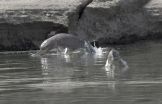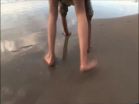(Press-News.org) The next time your children quibble about who gets to eat which part of a cake, call in some experts on the art of sharing. Mathematician Julius Barbanel of Union College, and political scientist Steven Brams of New York University, both in the US, published an algorithm in Springer's The Mathematical Intelligencer by which they show how to optimally share cake between two people efficiently, in equal pieces and in such a way that no one feels robbed.
The cut-and-choose method to share divisible goods has been regarded as fair and envy-free since Biblical times, when Abraham divided land equally, and Lot could choose the part he wanted. But being free of envy is not the only consideration when sharing something. What happens when more than two cuts can be made, or when people prefer different, specific sections of whatever is to be divided? Barbanel and Brams believe that with a giveback procedure it is possible to make a perfect division between two people that is efficient, equitable and void of jealousy.
An objective referee (such as a Mom or a computer) is essential to the plan. The potential cake eaters first tell the referee which parts of the delicacy they value most. In mathematical terms these are called someone's probability density functions, or pdfs. The referee then marks out the cake at all points were the pdfs of the disgruntled would-be cake eaters cross, and assigns portions. If at this point the two parties receive the same size of cake, the task is over. If not, the giveback process starts.
The party who received the larger part of the cake during the first round must give a part of it back to the other person, starting with those parts in which the ratio of their pdfs is the smallest. This goes on until the parties value their portions equally, and have the same volume of cake to eat. This method only works with a finite number of cuts if the players' pdfs are straight-lined, or are so-called piecewise linear sections.
The researchers believe the method can be used to share cake and other divisible goods such as land. In the case of beachfront property being co-owned by two developers, for example, it can help to determine who gets what strips of land to build on based on the pieces of land they value most.
"This allocation is not only equitable but also envy-free and efficient – that is, perfect," says Barbanel.
"This approach focuses on proving the existence of efficient and envy-free divisions, not on providing algorithms to finding them," emphasizes Brams.
INFORMATION:
Reference
Barbanel, J.B. & Brams, S.J. (2014).Two-Person Cake Cutting: The Optimal Number of Cuts, The Mathematical Intelligencer. DOI 10.1007/s00283-013-9442
Fair cake cutting gets its own algorithm
Method can be used to divide goods such as cake and land
2014-07-16
ELSE PRESS RELEASES FROM THIS DATE:
Borneo deforested 30 percent over past 40 years
2014-07-16
Forest cover in Borneo may have declined by up to 30% over the past 40 years, according to a study published July 16, 2014 in the open-access journal PLOS ONE by David Gaveau from the Center for International Forestry Research, Indonesia, and colleagues.
The native forests of Borneo have been increasingly impacted by logging, fire, and conversion to plantations since the early 1970s. Borneo lacks island-wide forest clearance and logging documentation, making forest conservation planning difficult, especially for selectively logged forests that have high conservation potential ...
Whale shark fringe migration
2014-07-16
At the fringe of the whale shark range, the volcanic Azore islands may play an increasing role for the north Atlantic population as sea surface temperatures rise, according to a study published July 16, 2014 in the open-access journal PLOS ONE by Pedro Afonso from University of the Azores and colleagues.
Whale sharks prefer tropical waters in the range of 26-30º C, but studies have shown that this large filter-feeding shark seasonally aggregates at highly productive coastal sites, sometimes at the edge of their preferred water temperature range. Whale sharks have been ...
Indus river dolphin's declining range
2014-07-16
Removal of river water for irrigation and habitat fragmentation by irrigation dams were shown to be the principal factors contributing to the decline of the Indus river dolphin, according to a study published July 16, 2014 in the open-access journal PLOS ONE by Gill Braulik from the Wildlife Conservation Society and University of St. Andrews and colleagues.
Many freshwater marine mammals are endangered due to rapidly degrading habitat and conservation of these megafauna species depends on maintaining intact habitat. This study used historical range data and information ...
Transplanting gene into injured hearts creates biological pacemakers
2014-07-16
LOS ANGELES (STRICTLY EMBARGOED UNTIL 2 P.M. EDT ON JULY 16, 2014) – Cardiologists at the Cedars-Sinai Heart Institute have developed a minimally invasive gene transplant procedure that changes unspecialized heart cells into "biological pacemaker" cells that keep the heart steadily beating.
The laboratory animal research, published online and in today's print edition of the peer-reviewed journal Science Translational Medicine, is the result of a dozen years of research with the goal of developing biological treatments for patients with heart rhythm disorders who currently ...
Sexual harassment and assault are common on scientific field studies, survey indicates
2014-07-16
CHAMPAIGN, Ill. — A survey of 142 men and 516 women with experience in field studies in anthropology, archaeology, geology and other scientific disciplines reveals that many of them – particularly the younger ones – suffered or witnessed sexual harassment or sexual assault while at work in the field.
A majority of the survey respondents (64 percent) said they had experienced sexual harassment (inappropriate sexual remarks, comments about physical beauty or jokes about cognitive sex differences, for example). And more than 20 percent reported they had been the victims ...
Potassium supplements may increase survival in patients taking diuretics for heart failure
2014-07-16
PHILADELPHIA—Researchers from the Perelman School of Medicine at the University of Pennsylvania found that patients taking prescription potassium supplements together with loop diuretics for heart failure have better survival rates than patients taking diuretics without the potassium. Moreover, the degree of benefit increases with higher diuretic doses. The team, including senior author Sean Hennessy, PharmD, PhD, associate professor of epidemiology in Penn's Center for Clinical Epidemiology and Biostatistics (CCEB), report their findings in a study published online July ...
Preeclampsia may share cause with disorders such as Alzheimer's
2014-07-16
New research has identified a potential cause of and a better diagnostic method for preeclampsia, one of the most deadly and poorly understood pregnancy-related conditions in the world. The international team, led by researchers at Nationwide Children's Hospital, discovered that the disease may result from a collection of protein mishaps like those associated with Alzheimer's disease. Their findings, released today by Science Translational Medicine, have already led to an affordable, fast and accurate urine test that could revolutionize the diagnosis of preeclampsia in ...
Walking on all fours is not backward evolution, study shows
2014-07-16
VIDEO:
This video is a sample of UTS walking patterns.
Click here for more information.
AUSTIN, Texas -- Contradicting earlier claims, "The Family That Walks on All Fours," a group of quadrupedal humans made famous by a 2006 BBC documentary, have simply adapted to their inability to walk upright and do not represent an example of backward evolution, according to new research by Liza Shapiro, an anthropologist at The University of Texas at Austin.
Five siblings in the family, ...
New study links dredging to diseased corals
2014-07-16
In a world-first study published today, researchers say dredging activity near coral reefs can increase the frequency of diseases affecting corals.
"At dredging sites, we found more than twice as much coral disease than at our control sites," says the lead author of the study, Joe Pollock, a PhD candidate from the ARC Centre of Excellence for Coral Reef Studies (Coral CoE) at James Cook University (JCU) and the Australian Institute of Marine Science (AIMS).
"Corals require both light and food to survive," Pollock explains. "And unfortunately, dredging impacts corals ...
Tooth plaque provides unique insights into our prehistoric ancestors' diet
2014-07-16
This news release is available in French. This news release is available in French. This news release is available in French.
An international team of researchers has found new evidence that our prehistoric ancestors had a detailed understanding of plants long before the development of agriculture.
By extracting chemical compounds and microfossils from dental calculus (calcified dental plaque) from ancient teeth, the researchers were able to provide an entirely new perspective on our ancestors' diets. Their research suggests that purple nut sedge (Cyperus ...
LAST 30 PRESS RELEASES:
The long standing commercialization challenge of lithium batteries, often called the dream battery, has been solved.
New method to remove toxic PFAS chemicals from water
The nanozymes hypothesis of the origin of life (on Earth) proposed
Microalgae-derived biochar enables fast, low-cost detection of hydrogen peroxide
Researchers highlight promise of biochar composites for sustainable 3D printing
Machine learning helps design low-cost biochar to fight phosphorus pollution in lakes
Urine tests confirm alcohol consumption in wild African chimpanzees
Barshop Institute to receive up to $38 million from ARPA-H, anchoring UT San Antonio as a national leader in aging and healthy longevity science
Anion-cation synergistic additives solve the "performance triangle" problem in zinc-iodine batteries
Ancient diets reveal surprising survival strategies in prehistoric Poland
Pre-pregnancy parental overweight/obesity linked to next generation’s heightened fatty liver disease risk
Obstructive sleep apnoea may cost UK + US economies billions in lost productivity
Guidelines set new playbook for pediatric clinical trial reporting
Adolescent cannabis use may follow the same pattern as alcohol use
Lifespan-extending treatments increase variation in age at time of death
From ancient myths to ‘Indo-manga’: Artists in the Global South are reframing the comic
Putting some ‘muscle’ into material design
House fires release harmful compounds into the air
Novel structural insights into Phytophthora effectors challenge long-held assumptions in plant pathology
Q&A: Researchers discuss potential solutions for the feedback loop affecting scientific publishing
A new ecological model highlights how fluctuating environments push microbes to work together
Chapman University researcher warns of structural risks at Grand Renaissance Dam putting property and lives in danger
Courtship is complicated, even in fruit flies
Columbia announces ARPA-H contract to advance science of healthy aging
New NYUAD study reveals hidden stress facing coral reef fish in the Arabian Gulf
36 months later: Distance learning in the wake of COVID-19
Blaming beavers for flood damage is bad policy and bad science, Concordia research shows
The new ‘forever’ contaminant? SFU study raises alarm on marine fiberglass pollution
Shorter early-life telomere length as a predictor of survival
Why do female caribou have antlers?
[Press-News.org] Fair cake cutting gets its own algorithmMethod can be used to divide goods such as cake and land


